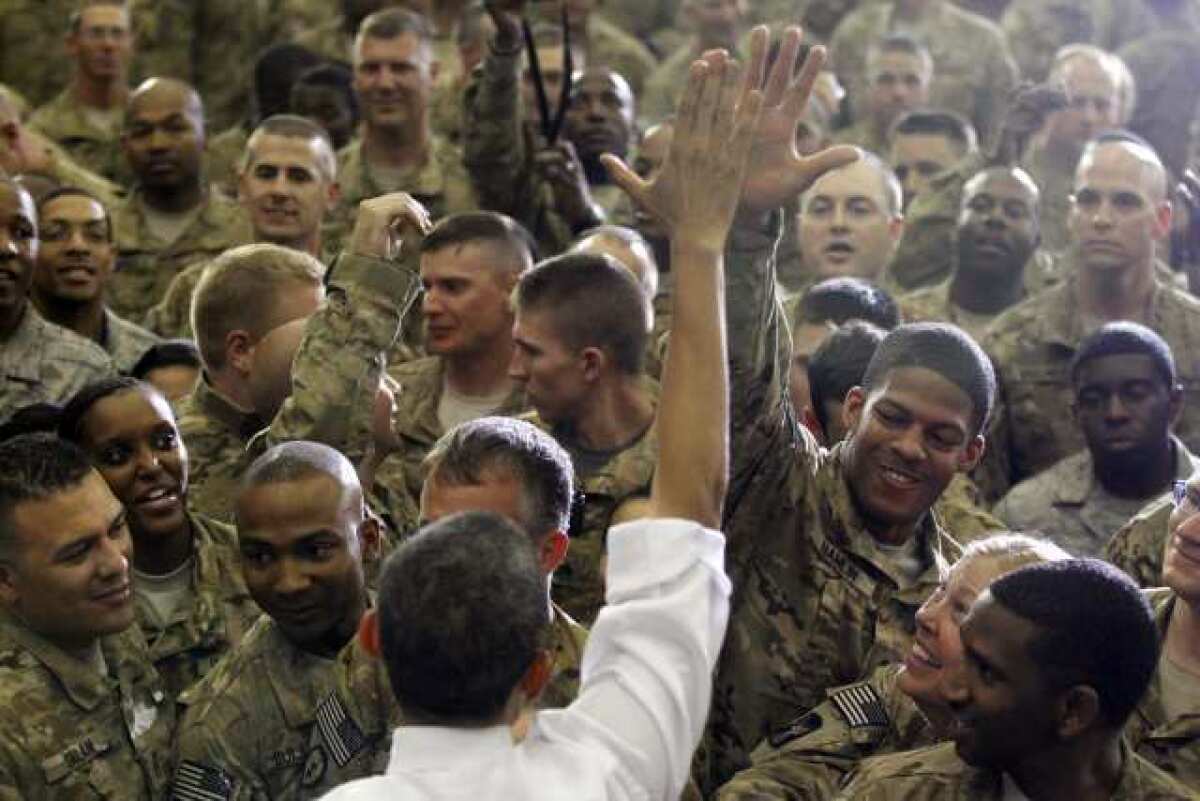McManus: All quiet on the war front

Here’s an important fact you haven’t heard much about in the presidential campaign: The armed forces of the United States are at war in at least four countries, and that number could increase any day.
About 87,000 Americans are still fighting in Afghanistan, and some are likely to stay past 2014. We’re at war in neighboring Pakistan too, mostly using unmanned drones but with a handful of people on the ground.
U.S. drone and special operations forces are also waging attacks in Yemen and Somalia, operations big enough that President Obama felt compelled to acknowledge them publicly last month in a letter to Congress.
PHOTOS: Obama makes unannounced visit to Afghanistan
In addition, theU.S. Navyis hunting pirates in the Indian Ocean and patrolling offIran’scoast in the Persian Gulf, and in both missions shots have been fired.
American troops are training and advising counter-terrorism forces in West Africa and the Philippines. More troops are on the ground in central Africa, helping local troops root out the brutal Lord’s Resistance Army.
And those are just the missions we know about. U.S. special operations forces are engaged in “more than 100 countries worldwide,” Adm. William H. McRaven of the Special Operations Command told the Senate last month. Most of those engagements don’t involve actual combat, but because what McRaven’s units do is secret, it’s impossible to say exactly how many places U.S. forces are fighting in at any given time.
COMMENTARY AND ANALYSIS: Presidential Election 2012
So why, when American troops are engaged in so many places, are the operations receiving so little public attention?
Some of the reasons for our national inattention are obvious. Americans, and the presidential candidates, are preoccupied with the travails of the domestic economy. And now that we have a professional, all-volunteer military, a narrower cross section of Americans has a family member in the armed forces.
But another reason we’re hearing so little about U.S. combat operations is that we have two presidential candidates who don’t seem all that comfortable with their own positions on war and peace.
In 2008, Obama could run as an antiwar candidate, but that’s hard to do as commander in chief of a military engaged in combat — and one who dramatically increased drone strikes. The president has made a commitment to keep troops in Afghanistan through 2014, and he plans to keep advisors and trainers there even longer. But he has never seemed all that enthusiastic about putting American lives and money into defending Hamid Karzai’s regime.
Moreover, he knows the Democratic voters he’s relying on for reelection grew sick of the war long ago. A nationwide poll released by the Chicago Council on Global Affairs this week found that 67% of Americans think the war in Afghanistan is not worth fighting, and that number rises to 79% among Democrats. It’s no wonder the president doesn’t talk about it much, beyond noting that he’s set a date for pulling out most of the troops.
Mitt Romney has an equally thorny dilemma. Unlike Democrats, Republicans are deeply divided over the war. The Chicago Council poll found that although 58% of Republicans say the war isn’t worth fighting, 41% still think it’s worthwhile.
That means that Romney has to tread lightly. As much as he’d like to criticize the president’s handling of the war, finding the right grounds to do so has proved tricky. He criticized Obama’s 2014 deadline for a troop drawdown, only to later call it “the right timetable.” He has expressed support for the war effort in Afghanistan while at the same time saying that “we’ve learned that our troops shouldn’t go off and try and fight a war of independence for another nation.”
But with U.S. citizens engaged in seven or more conflicts around the world, don’t both candidates owe us some plain talk about their plans? How many troops would they keep in Afghanistan after 2014, and how long would they keep them there? How would they deal with Pakistan, our most troublesome “frenemy”? If sanctions don’t cause Iran to abandon its work on building a nuclear weapon, would they support military action there? And what about Syria?
Later this month, Romney plans to head to London (to remind voters that he once ran the Winter Olympics), Israel (to remind pro-Israel voters that Obama hasn’t been there since taking office) and Poland (to remind hawks that he favors more spending on missile defense).
While he’s abroad, he should seize the opportunity to talk more about America’s many armed conflicts and how he would handle them. And he should challenge Obama to explain his thoughts on military engagement too.
Judging from the current state of the campaign, both candidates seem as if they could use a change of subject. And so could we.
More to Read
A cure for the common opinion
Get thought-provoking perspectives with our weekly newsletter.
You may occasionally receive promotional content from the Los Angeles Times.











